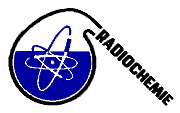Speaker
Dr
Antonín Vokál
(Nuclear Research Institute Řez plc)
Description
Repositories for radioactive wastes are sited in the environment with very low permeability. One of the most important processes leading to the release of radionuclides to the environment is diffusion and therefore data for its evaluation are very important for the results of performance assessment of these repositories. These data are obtained usually from the evaluation of laboratory through-, in- or out-diffusion experiments, which are evaluated by various mathematical methods that have to take into account also deficiencies of real experimental equipments. E.g., a very long experimental time is needed for sorbing radionuclides to achieve stationary conditions under which the standard evaluation of the through-diffusion experiment is applicable. In such cases only values of apparent diffusion coefficients are usually obtainable from evaluation of in- or out- diffusion experiments. A robust performance assessment codes, however, require knowledge of effective diffusion coefficients and equilibrium sorption coefficients, which cannot be easily obtained by the evaluation of in- and/or out- diffusion experiments. This fact can lead to the propagation of uncertainties in performance assessment of radioactive waste repositories. In this paper a new approach is proposed for the evaluation of diffusion data for performance assessment. This approach consist in the following steps: i) experimental measurements of material diffusion parameters (tortuosity, transport porosity) under various conditions (e.g. different density, different ionic strength of water) using non-sorbing radionuclides such as tritium and chlorine for which it is easy to reach conditions under which mathematical solution of diffusion equation is applicable, ii) to measure sorption isotherms for sorbing radionuclides by batch methodology, iii) to calculate diffusion coefficients for sorbing radionuclides from well-defined diffusion coefficients in free water and determined tortuosity, transport porosity and sorption coefficients, iv) to carry out the relatively short in-diffusion experiments with sorbing radionuclides and v) to compare experimental results with simulated curves using the performance assessment computer code. We see the advantage of this approach in the use of the same computer code both for verification of the laboratory diffusion results and for the performance assessment. The uncertainty of description of diffusion in performance assessment is therefore decreased. The relationships between measured data and parameters used in performance assessment are discussed on the basis of batch sorption and diffusion experiments performed for HTO, 36Cl and 137Cs with different types of bentonite.
Primary authors
Dr
Antonín Vokál
(Nuclear Research Institute Řez plc)
Dr
Dušan Vopálka
(Department of Nuclear Chemistry, Czech Technical University in Prague)

